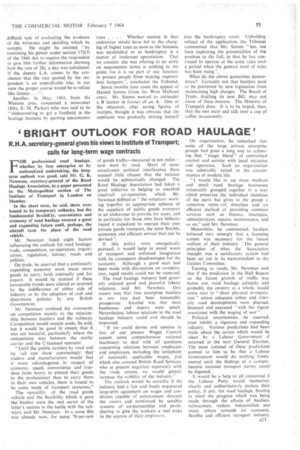BRIGHT OUTLOOK FOR ROAD HAULAGE'
Page 57

If you've noticed an error in this article please click here to report it so we can fix it.
R.H.A. secretary-general gives his views to Institute of Transport; calls for long-term wage contracts FOR, professional road haulage, whether by free enterprise or by nationalized undertaking, the longterm outlook was good, said Mr. G. K. Newman, secretary-general of the Road Haulage Association, in a paper presented to the Metropolitan section of The Institute of Transport in London on Monday.
In the short term, he said, there were bound to be temporary setbacks, but the fundamental tlexibilly, convenience and economy of road haulage ensured a great and expanding future until, perhaps, the aircraft took the place of the road vehicle.
Mr. Newman listed eight factors influencing the outlook for road haulage: trade, competition, co-operation, organization, regulation, labour, roads and politics. On trade, he asserted that a continually expanding economy must mean more goods to carry, both internally and for export. It would be ironical if these favourable trends were altered or reversed by the indifference of either side of industry or by the adoption of rash and doctrinaire policies by any British Government.
Mr. Newman confined his comments on competition mainly to the relationship between hauliers and the railways. Competition would remain acute, he said, hut it would be good tb ensure that it was not wasteful, particularly where the competition was between the public carrier and the C-licensed operator.
"Until the public carriers by road and by rail can show convincingly that traders and manufacturers would find it more advantageous in respect of economy, speed, convenience and freedom from worry to entrust their goods to the professional than to carry them in their own vehicles, there is bound to be some waste of transport resources."
The versatility of the road goods vehicle and the flexibility which it gave the haulier were the real secret of the latter's success in the battle with the railways, said Mr. Newman. In a sense this was already won, for some 70 per cent of goods traffic—measured in ton miles— now went, by road. Short of some cataclysmic political interference there seemed little chance that the balance would be substantially changed. The Road Haulage Association had taken a great initiative in helping to establish road/rail co-operation. which Mr. Newman defined as "the voluntary working together in appropriate spheres of the suppliers of public goods transport in an endeavour to provide for users, and in particular for those who have hitherto found it expedient to operate their own private goods transport, the most flexible, economic and efficient service that can be devised ".
If this policy were energetically pursued, it would help to avoid waste of transport and enforced integration with its consequent disadvantages for the economy. Although a good start had been made with discussions on co-operation, rapid results could not be expected.
The road haulage industry had generally enjoyed good and peaceful labour relations, said Mr. Newman. One reason was that free enterprise hauliers at any rate had been reasonably prosperous. Another was that most businesses and depots were small. Nevertheless, labour relations in the road haulage industry could and should be improved.
" If we could devise and operate in lieu of our present Wages Council system some comprehensive national machinery to deal with all questions concerning relations between employers and employees, including the settlement of nationally applicable wages, and which also covered British Road Services. who at present negotiate separately with the trade unions, we would greatly increase the stability of the industry."
The outlook would he enviable if the industry had a fair and freely negotiated long-term agreement on wages and conditions capable of enforcement through the courts and reinforced by sensible systems of co-partnership and profitsharing to give the workers a real stake in the success of their employers. On organization, he remarked that some of the large private enterprise groups had gone a long way to achieving that "magic blend" of centralized control and service with local initiative and operation. Such an organization was admirably suited to the circumstances of modern life.
" I would like to see more medium and small road haulage businesses voluntarily grouped together in a way which preserves the individual identities of the parts but gives to the group a conscious sense -of direction and an efficient method of providing common services such as finance, insurance, administration, repairs, maintenance, and so on," said Mr. Newman.
Meanwhile, he commented, hauliers believed very strongly that a licensing system was necessary for the future welfare of their industry. The general principles of what the Association thought was a satisfactory system had been set out in its memorandum to the Geddes Committee.
Turning to roads, Mr. Newman said that if the prediction in the Hall Report on the future growth of traffic was borne out, road haulage certainly and probably the country as a whole, would come near to "sheer physical strangulation " unless adequate urban and intercity road developments were planned, financed and executed " with the vigour associated with the waging of war ".
Political uncertainties, he asserted, must inhibit a vigorous and expanding industry. Various predictions had been made about the action which would be taken by a Labour Government if returned at' the next General Election. The most rational of these predictions seemed to him to be that a Labour Government would do nothing fundamental until the findings of a comprehensive national transport survey could be digested.
It would be a help to all concerned if the Labour Party would themselves clearly and authoritatively declare their policy, if any, for road haulage, bearing in mind the progress which was being made through the efforts of hauliers. railwaymen, traders, industrialists and many others towards an economic flexible and efficient transport industry.




















































































































